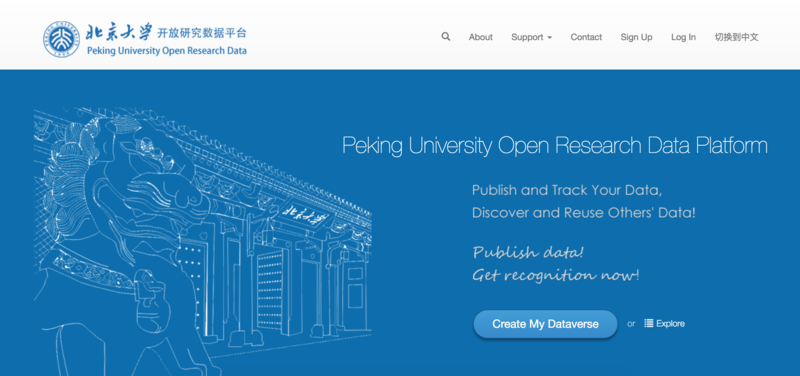 Peking University (PKU) recently released their Open Research Data Platform for their university with code forked from our Dataverse github repository (with several brilliant institution-specific customizations), and so we invited them to answer a few questions about their Dataverse
Peking University (PKU) recently released their Open Research Data Platform for their university with code forked from our Dataverse github repository (with several brilliant institution-specific customizations), and so we invited them to answer a few questions about their Dataverse
When did you launch the Peking University Dataverse?
The beta version of Peking University Open Research Data Platform was launched on December 25, 2015, it is a cooperation between Peking University Library, Data Center for Management Science, NSFC-PKU, Office of scientific research, PKU, and Office of Social Science, PKU. Peking University Open Research Data Platform is the first Chinese version on Dataverse 4.0, and has become the data publishing platform for a major sustainable project “China Survey Data Archive (CSDA)” supported by National Natural Science Foundation of China. With long-term cooperation with CSDA, more and more high-quality survey data in China will join the platform and promote the development and influence of platform.
Fig 1. Home page of Peking University Open Research Data Platform
Why did you choose Dataverse as the software for your repository?
Peking University chose Dataverse for data repository in 2014 because Dataverse has the big advantage of being open source software, which includes: lower cost, excellent architecture, active development, rich and useful functions, and active community, and more important, Dataverse perfectly meets Peking University’s core requirements for open research data platform:
- Standard metadata and good interoperability,
- Complete and flexible permissions management and data access control,
- Data Publishing function associated with persistent identifier and version record,
- Online data analysis and visualization.
As Dataverse 4.0 has big improvements in data discovery, interface and user experience, support of multidisciplinary data, Peking University migrated to Dataverse 4.0 from Dataverse 3.3 in June 2015, and completed major localization development as following:
- bilingual interface and bilingual content by adding second language information blocks for dataverses and datasets,
- Improved user group management functions, added data request function associated with application of joining user group,
- Supported online view, export and visualization of usage statistics data,
- Featured dataverses in home page,
- DOI registration, [now also available in Dataverse 4.3's core code thanks to Peking University]
- SSO Authentication for PKU scholars.
What kinds of researchers are depositing into your repository?
Peking University Open Research Data platform currently has collected over 15 Dataverses, 74 datasets and 265 data files, majority are survey and census data, open source coding and tools, network data extracted from social media, life science database, deposited by both research institutions and researchers from disciplines such as Social Science, Computer Science, Health and Life Science, Earth and Environmental Science, Atmospheric and Oceanic Science, Chemistry, etc. The most common file types include: text files (i.e. txt, doc, pdf), data files (i.e. dta, spss, xls, csv, etc), image files (i.e. jpg, png, pdf), and spectrum data.
Featured Dataverses include:
- China Family Panel Studies, CFPS
- China Health and Retirement Longitudinal Study, CHARLS
- The Research Center For Contemporary China
- Center for Healthy Aging and Development Studies
- Data and Information Management Group, Peking University
- GIS software (Geosoft) Laboratory, Peking University
- Visualization and visual analytics research group, Peking University
Do you offer any particular services to your researchers with regards to helping them deposit, curate and preserve their data?
Peking University Library offers the following services to promote the managing, sharing, reusing and citing of research data, and data’s long term preservation.
- Data curation service for research data’s lifecycle: In cooperation with Data Center for Management Science, NSFC-PKU, Peking University Library will work with researchers together to improve the procedure of metadata recording, data creating, data format transferring and data depositing and publishing.
- Data related publications tracking: collect and cleaning data related publications and deposit to Peking University’s institutional repository, create two-way links between data and publication.
- Embedded into courses and teaching: help researchers to created course dataverses and sample datasets to discuss and do online analysis during teaching.
- User training and user mail group: Hold user training meeting for institutions and researchers. Created mail group for dataverse manager, send mails of usage statistics and functions updates of platform.
- Strong technical support for customers. Many customization have been made for PKU’s Open Research Data Platform.
Are there any particular aspects of your Dataverse that would you like us to showcase?
Platform Slogans:
重用数据,再现科研;提升引用,跟踪影响。
Publish and track your data, discover and reuse other’s data.
开放数据,为您的研究点赞!
Publish data, get recognition now!- On 2015.4.28, the steering committee of experts was set up, consisting of Peking University professors from School of Government, National School of Development, School of Journalism and Communication, College of Environmental Science and Engineering, School of Mathematical science, Department and Institute of Sociology and Anthropology, and so on.
- On 2015.11.16-18 a “Research Data Management" Seminar was held jointly by Data Center for Management Science, NSFC-PKU and Peking University Library, in Beijing.
